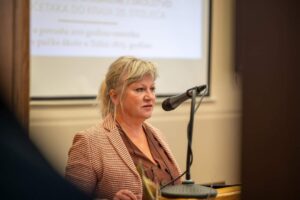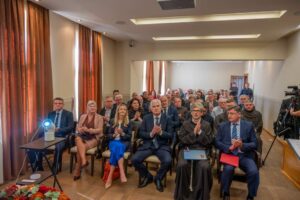The Federal Minister of Culture and Sports, Sanja Vlaisavljević, participated in the International Scientific Symposium titled “The Franciscans of the Bosna Srebrena and Education from the Beginning of the 20th Century to its End – on the Occasion of the 200th Anniversary of the Foundation of the First Public School in Tolisa in 2023″, which was held on 13 October 2023 in the Franciscan Monastery of Tolisa.
The participants and visitors of the scientific symposium were greeted by the host of the meeting, Friar Mario Jurić, the guardian of the Franciscan Monastery of Tolisa, who emphasised that the friars were still putting a lot of effort not only in providing the population with knowledge, but also in teaching and educating them in values that were permanent and which remained even when knowledge evaporates.
Minister Sanja Vlaisavljević delivered the following speech on the symposium:
School teaches us to understand reality. Going to school means opening one’s mind and heart to reality, in the wealth of its aspects, of its dimensions, Pope Francis said.
It is an honour of mine to be here with you today on this noble occasion of knowledge and education.
School is not just a place where one can acquire knowledge. Sometimes it is not even that. School is a place that turns mirrors into windows. Wide open windows from which we see not what we are told to see but what we are given to see taught to keep our eyes wide open.
Once upon a time, in the year 529, the Emperor Justinian ordered all schools of philosophy in the Ancient Greece to be closed. That was the beginning of the dark period of history. Darkness and silence over knowledge and teaching.
Decades later, in small Tolisa in the Northern Bosnia, Fr. Ilija Starčević became aware of the fact that education and schooling were the essence of progress.
His wisdom was the embodiment of teaching, which he entrusted to a civilian teacher, Ilija Boričić. The teacher who did not lead the first hundred enrolled students to enter the house of wisdom, but the teacher who led them to the threshold of their own mind.
It was not easy for Brother Ilija. He needed a permission of the Turkish authorities for the school, and he also had to bring a teacher from Slavonija, and take over the curriculum from Croatia. However, the teacher from Slavonija left Tolisa after a few years, so that Brother Ilija had to take over teaching, but without closing the school to civilian pupils.
And so, the time was passing, and the school became more and more famous and important.
It was here where the first maths manual for the first and second grades was created, or to say in the language of that time – the “first calculation”.
But this mathematician and Latin scholar wrote his poem “Reception” (“Doček”) right here. Among other verses, he described the beauty of this region and this occasion:
“The lark mesmerizes the village with a solemn song;
In the deep night, you can hear nightingale rich in voices
As he sings a sweet aria until dawn,
Excited herds run and jump across the meadows,
And with joyful voices they speak of new joys.”
Two hundred years later, today and here in the magical Tolisa, another reception was held – reception of the people who worship education, who celebrate knowledge. I hope this is only the first two hundred years! Good luck!
The international scientific symposium was organised jointly by the Franciscan Province of Bosna Srebrena, Croatian Academy of Sciences and Arts – Institute of Historical Sciences in Zadar, Croatian Institute of History, Croatian Institute of History – Branch for the History of Slavonia, Srijem and Baranja, University of Mostar, Franciscan Theology Sarajevo and Tolisa Franciscan Monastery, and was held under the high auspices of the Croatian National Congress of Bosnia and Herzegovina and the co-sponsorship of the Central State Office for Croats outside of the Republic of Croatia, Federal Ministry of Culture and Sports, Government of the Posavina Canton and City of Orašje.

